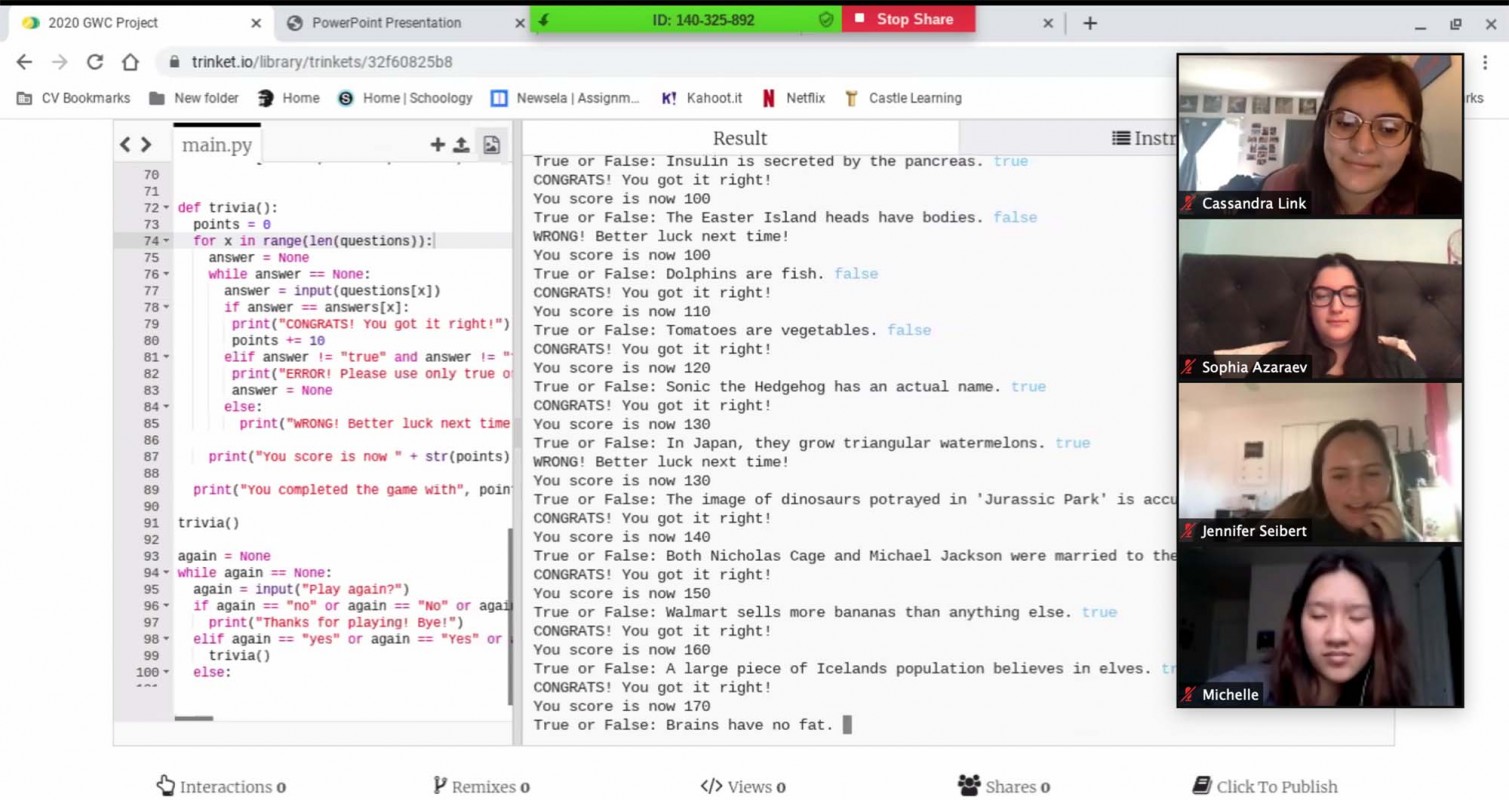Amid COVID-19 quarantine, Girls Who Code continue classes with high schoolers online
Watson School students give lessons in Java, Python via Zoom sessions

When the COVID-19 pandemic forced most Binghamton University students off campus in mid-March, members of Girls Who Code (GWC) had a choice.
Should the weekly classes for Binghamton-area high schoolers move online like their University coursework? Or should the classes finish early and pick up again in the fall?
For the leaders of the group — organized through the Thomas J. Watson School of Engineering and Applied Science — there was really only one answer. They had to keep going.
“I got to know a lot of the students earlier in the semester, and they were so happy to be at Girls Who Code that it would have been so sad to just end it there,” said Caitlin Tsang, a junior majoring in biomedical engineering who serves as the co-programming manager for the Binghamton chapter.
GWC organizers asked instructors if they’d be willing to continue, even though their own lives were being disrupted as well. “All of them replied yes,” Tsang said. “That was the driving force behind why we wanted to continue the program.”
Twenty girls had attended this semester’s first four GWC classes on campus to learn about the Java and Python programming languages, but only seven were able to join the remaining sessions online. Some students from lower-income homes didn’t have access to computers or reliable internet connections during the quarantine.
“It was definitely difficult for us to transition,” said Amelia Chesebro, a sophomore majoring in computer science who is GWC’s lead Java instructor. “We have a very strict child protection policy, and we weren’t sure if we would be able to Zoom-call with them. They have to have their cameras off all the time. That was hard.
“But the students who decided to stay were enthusiastic enough about the program, and they definitely helped us make the transition because they kept coming to class and ready to learn.”
On a recent Saturday morning, this semester’s GWC class gathered in a Zoom chat with their instructors and others from the Watson School for an online “graduation” where they showed and discussed their final projects.
One group made an interactive trivia game; another created a program meant for refrigerator doors where users could enter their ingredients and get meal ideas. And in a sign of the times, some students used Python to input and track COVID-19 cases in the U.S. and then display them as easy-to-understand graphics.
“It was harder transitioning for our Python class,” said Stephanie Greenberg, a junior majoring in computer science who is GWC’s co-programming manager. “Our Java class had a lot of returning students, so they know the program and they’re more enthusiastic about learning. It was a little harder to maintain the numbers for the Python students. We definitely gave individualized attention to the ones who did show up.”
Girls Who Code, a nonprofit founded by Reshma Saujani, has taught more than 50,000 elementary, middle school and high school students across the U.S. since 2012. Binghamton University’s chapter started in the spring 2019 semester; advising the group is Professor Hiroki Sayama from the Department of Systems Science and Industrial Engineering.
The national organization provides suggested curriculum and instructional materials online, but local groups still need to devise their own lesson plans and recruit students from their own areas.
For this semester, Binghamton’s GWC chapter has reached out more to students in lower-income homes who might not otherwise have access to strong STEM instruction, said Abby McHugh, a junior majoring in computer science who is GWC’s internal manager. That’s meant, for example, more students from Binghamton High School.
GWC also has done more outreach and workshops with teachers and others in the community to spread the word about what the group offers.
“We’ve tried to become a more outward-facing organization and grow roots in the larger Binghamton community,” she said. “That’s resulted in a more diverse group of students.
“The one issue is that because we specifically recruited underprivileged student groups, they are the ones disproportionately affected by the pandemic. They’re the ones who don’t have access to computers, and their schools don’t have the money or infrastructure to give them free laptops..
Despite the challenges of this semester, GWC organizers are already looking ahead to the fall, when they plan to offer not only Java and Python classes but also instruction in app-building.
There also have been unexpected opportunities to learn, Greenberg said: “Watching how our teachers have transitioned online has been helpful, because we see what works and what doesn’t, then implement that in our classes.”
